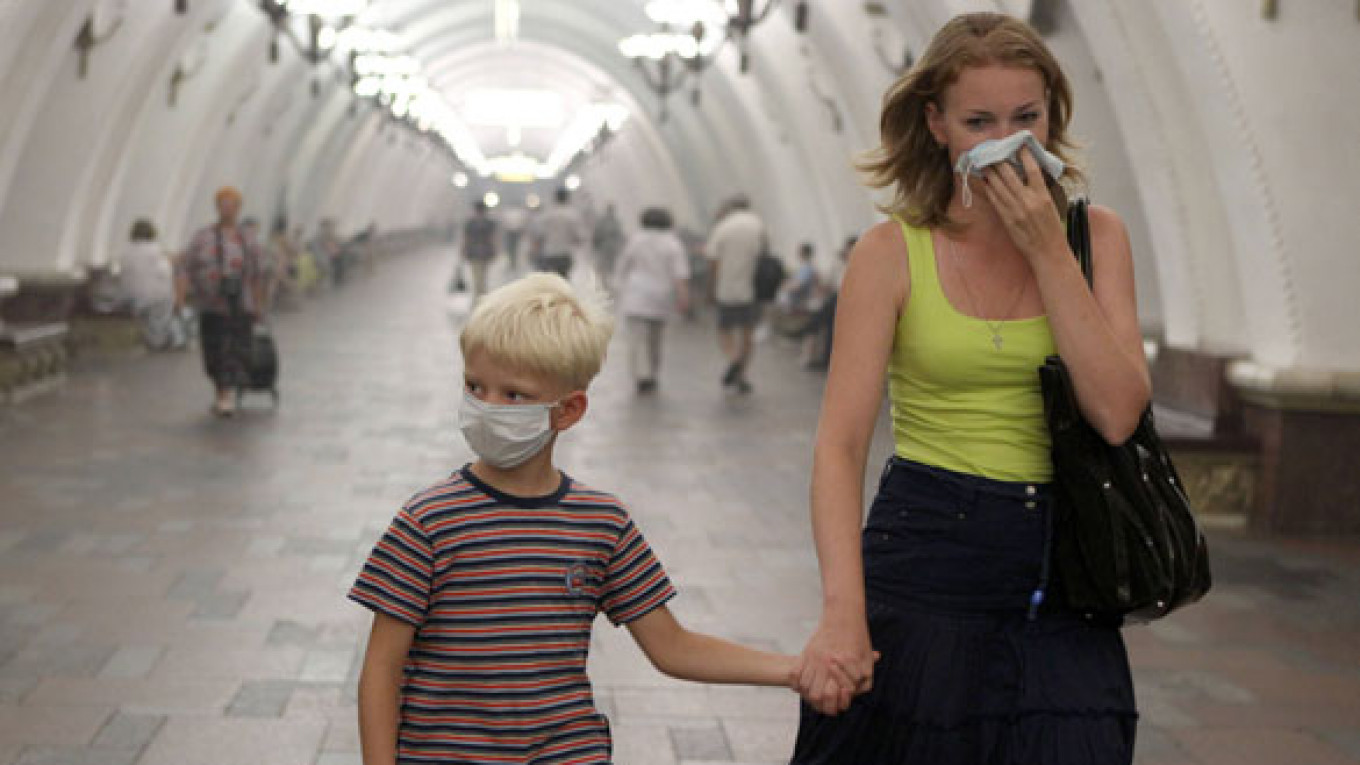A suffocating smog from wildfires hung over Moscow, raising the concentration of dangerous pollutants to a new high as exasperated residents donned face masks and dozens of flights were delayed or diverted at the city's airports.
The thick haze engulfed Moscow on Saturday, after several straight days of mild to medium smog, as southeastern winds brought in smoke from the areas worst-affected by peat bog and forest fires. Weather experts said the winds aren't likely to change for the next few days.
The concentration of airborne pollutants, such as carbon monoxide, has intensified. The level is at more than six times normal levels, according to city health officials ― the worst seen to date in the capital. The smog has seeped into buildings and the city's subway system.
"I can't bear it any more," Anna Kozyreva, 25, said. "My parents have left the city. All I want to is breathe normally, but my job doesn't allow me to leave."
"The smoke is everywhere ― at home, in shopping malls, on the subway," said Roman Morozov, a 29-year old architect.
Visibility was down to a few hundred meters, and dozens of flights bound for Moscow's Domodedovo and Vnukovo airports had been diverted to other airports or delayed.
Nearly 600 separate blazes were burning nationwide Saturday, mostly in western Russia, according to the Emergency Situations Ministry, which said the area affected by fires had increased over the last 24 hours. Hundreds of forest and peat bog fires have ignited amid the country's most intense heat wave in 130 years of recordkeeping.
Health officials have urged those who must go outdoors to wear face masks and told people staying inside to hang wet towels to attract dust and cool the air. The Russian Health Ministry said the smog has caused hundreds to require medical attention.
Yelena Lezina, an expert with Moscow Ecological Monitoring Service, said the level of air pollution on Saturday was the highest that the city had seen. She advised residents to stay indoors.
Gennady Onishchenko, the nation's chief sanitary official, tried Saturday to assuage foreign tourists spooked by the Russian smog.
"An overwhelming part of Russia's territory does not pose any danger and is not engulfed in smoke," he said, according to Interfax.
But he said that foreigners in Moscow on business trips should heed medical advice and stay indoors for now.
"If a businessman visiting Moscow stays in a hotel, or an office, or a car, it is safe," Onishchenko said. "As for tourists, some adjustments could be made. For instance, visit first St. Petersburg, where everything is fine, and then Moscow, when the situation improves," he said.
Nationwide, at least 52 people have died and 2,000 homes have been destroyed in the blazes. Officials have acknowledged that the 10,000 firefighters battling the blazes aren't enough, an assessment echoed by many residents in affected villages, who said fires swept through their towns in minutes.
Some Moscow residents angrily denounced the authorities for failing to do enough to help the population.
"People are left on their own here in Moscow," said Natalia Lancerot. "We are actually shocked that no one cares about people. They should maybe hand out protection masks."
President Dmitry Medvedev donated 350,000 rubles ($12,000) of his own money to help the victims of the fires, and other top federal officials were expected to follow suit, the Kremlin said Saturday.
A handful of countries sent firefighting aircraft to Russia to help battle the wildfires.
Russian television on Saturday showed two Italian firefighting amphibious planes arriving in the Samara region to help save a nature preserve engulfed by fires.
On Saturday, the military rushed to extinguish new wildfires outside a missile-attack warning center in the Kolomna region, which is southeast of Moscow. A wildfire last week caused huge damage at a military base outside Moscow.
Moscow and most of western Russia has registered temperatures approaching 38 degrees Celsius, in contrast to the region's typical summer temperature of about 23 C. The temperature is expected to remain unchanged at about 38 C over the next week.
For compelling images of Russia's wildfires and Moscow's smoke, visit The Moscow Times photo gallery Trial by Fire.
A Message from The Moscow Times:
Dear readers,
We are facing unprecedented challenges. Russia's Prosecutor General's Office has designated The Moscow Times as an "undesirable" organization, criminalizing our work and putting our staff at risk of prosecution. This follows our earlier unjust labeling as a "foreign agent."
These actions are direct attempts to silence independent journalism in Russia. The authorities claim our work "discredits the decisions of the Russian leadership." We see things differently: we strive to provide accurate, unbiased reporting on Russia.
We, the journalists of The Moscow Times, refuse to be silenced. But to continue our work, we need your help.
Your support, no matter how small, makes a world of difference. If you can, please support us monthly starting from just $2. It's quick to set up, and every contribution makes a significant impact.
By supporting The Moscow Times, you're defending open, independent journalism in the face of repression. Thank you for standing with us.
Remind me later.


